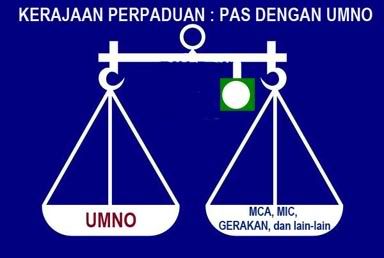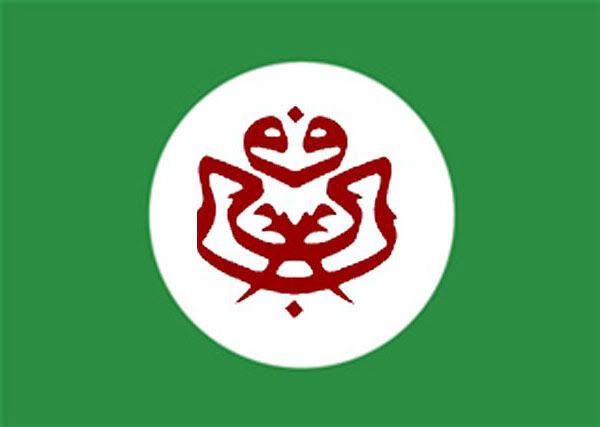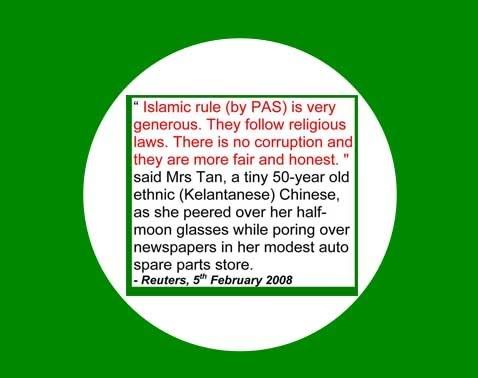

OR

Quote
The bottom line for PAS is this:
- Is it an Islamic party trying to create an Islamic state?
- Or is it a party that stands for Islam AND Malay nationalism?
This question has yet to be answered in a conclusive way.
IF PAS is for the establishment of an Islamic state, then it will have problems with DAP and all the non-Malay BN parties.
If it is for Islam AND Malay Race , then how is it DIFFERENT from Umno?
The recent PAS congress saw this ambiguity rise to the surface when the PAS Youth wing passed a resolution calling on PAS to retain the 30 per cent cap for Bumiputera businessmen.The “30 per cent” catchphrase is synonymous with Umno.
Hence what is the DIFFERENCE between PAS and UMNO?
The difference may be in the way the delegates dress but in substance, there may not be much of a difference.The big problem for PAS in Malaysia is that, unlike other Islamic countries in the world, the constitutional definition of a Malay includes religion, Islam.
Thus PAS cannot separate race from religion unlike the situation in Indonesia or Iran.
Until PAS resolves this problem of the Malay race being equated with Islam, it will have to walk along the SAME road as UMNO.
The only question is whether it wants to travel in the same car or different car...."
-James Chin
Read here article "Quo vadis Pas ?" by James Chin on Malaysian Insider
Quo Vadis PAS ?
by
James Chin
Excerpts:
PAS is an interesting political creature.
It was started by a group of Umno members who were unhappy with Umno's “secular” outlook and early on wanted an Islamic model for Malaya, and later Malaysia.
Pre-March 2008 Election
In the early years, PAS was closeted in the Malay belt of Kedah, Terengganu, Kelantan and Perlis. Kelantan and Terengganu were always its stronghold. It could not break out electorally into the other states.
In 1973, it was caught up in Tun Razak’s new unity government called Barisan Nasional (BN) and joined.
Three years later, in 1977, it was booted out of BN for undermining the BN in Kelantan after PAS was split into a pro-Umno and anti-Umno faction. Since then it has been an opposition party.
Until the early 1990s, PAS was still very much closeted in the Malay belt. Although it was part of the Gagasan Raykat led by Tengku Razaleigh Hamzah in 1990, it was still unable to break out of the Malay heartland.
Its mantra of an Islamic state was deemed unacceptable to the Chinese community and DAP paid a heavy price for “sleeping” with PAS via Semangat 46 in 1990. Who can forget the infamous MCA slogan “a vote for DAP is a vote for PAS and Islamic state”?
" PAS for ALL" Slogan
Hence the recent PAS inroads into the non-Malay community is remarkable.
PAS's clever public relations — the slogan “PAS for All” — was a masterstroke. The term “Islamic state” was put in small letters and PAS leaders began to talk about issues dear to all Malaysians — justice, poverty, end of racial discrimination, etc.
No doubt the electorate was happy to accept PAS since many of the non-Malays were caught up with ABU — Anyone But Umno.
Using the “PAS for All” slogan finally allowed the party to escape the Malay belt. Now the party had national aspirations.
PAS's Dilemma
The problem was now it has to face PKR, in addition to Umno, for votes. PKR is not so much a problem as Umno.
The bottomline for PAS is this:
Is PAS an Islamic party trying to create an Islamic state? IF PAS is for the establishment of an Islamic state, then it will have problems with DAP and all the non-Malay BN partiesThis question has been with PAS since Day One and it has yet to be answered in a conclusive way.
Or is PAS that stands for Islam and Malay nationalism? If it is for Malay race and Islam, then how is it different from Umno?
The recent PAS congress saw this ambiguity rise to the surface.
PAS, Malay Nationalism and and the Faction for Malay-Unity with UMNO Controversy
The PAS Youth wing passed a resolution calling on the party to retain the 30 per cent cap for Bumiputera businessmen.
As we all know, the “30 per cent” catchphrase is synonymous with Umno.
Since Islam does not condone racism and all Muslims are equal, you really have to ask if the PAS Youth call is against the true spirit of Islam since in practice it is racial/religious discrimination. The call is in line with Malay nationalism but not an Islamic state. (I wonder what the PAS Supporters Club has to say about this resolution?)
The call for “unity” talks by one faction in PAS is also a manifestation of this ambiguity.
Let us be frank. The “unity” talks are all about Malay unity and will lead to an all-Malay/Muslim government, if successful.
Hence what is the difference between PAS and Umno?
The difference may be in the way the delegates dress. But in substance, there may not be much of a difference.
PAS Youth Unable to Separate "Malay" from "Islam"
Many in the PAS Youth are graduates in Islamic studies (courtesy of the BN’s government in setting up Islamic studies courses in almost all public universities) from local universities and they cannot escape the notion of equating being Malay with Islam.
The big problem for PAS in Malaysia is that, unlike other Islamic countries in the world, the constitutional definition of a Malay includes religion, Islam.
Thus PAS cannot separate race from religion unlike the situation in Indonesia or Iran. If PAS were based in Indonesia, I’m sure none of the delegates will talk about the 30 per cent.
Until PAS resolves this problem of the Malay race being equated with Islam, it will have to walk along the same road as Umno. The only question is whether it wants to travel in the same car or different car.
Those who wish to know about PAS and its early days are recommended the following:
• John N. Funston, “Malay politics in Malaysia: a study of the United Malays National Organisation and Party Islam”, Kuala Lumpur : Heinemann Educational Books (Asia), 1980.
• Farish A. Noor, “Islam embedded: the historical development of the Pan-Malaysian Islamic Party, PAS: 1951-2003”, Kuala Lumpur : Malaysian Sociological Research Institute, 2004.
No comments:
Post a Comment